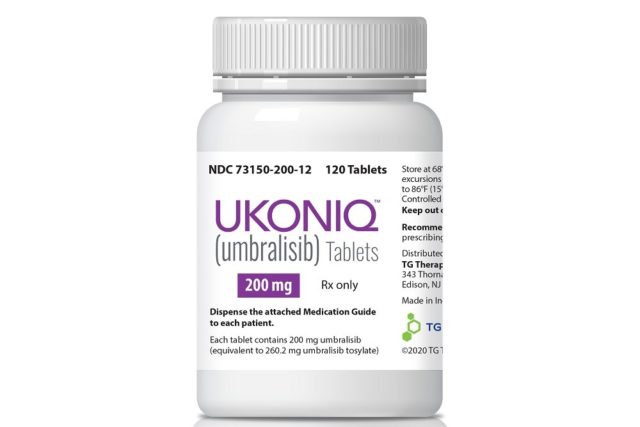
Last year, TG Therapeutics cheered the regulatory approval and commercial launch of its first drug, a treatment for advanced cases of a type of lymphoma. The biotech aimed to expand use of that drug, Ukoniq, as part of a combination treatment for another type of cancer. TG was preparing to make the case for the drug pairing during an FDA advisory panel meeting this week.
Instead, the biotech is withdrawing that drug application and it’s also pulling the approved drug, Ukoniq, from the market as it presses pause on all of its cancer programs. The move was unintentionally prescient. Soon after New York-based TG announced its strategy change last Friday, the journal The Lancet published an paper authored by FDA officials explaining safety concerns the agency has about the broader drug class to which Ukoniq belongs. Instead of defending Ukoniq in front of an FDA advisory panel, TG CEO Michael Weiss is defending his company’s decision to pull out of cancer.
“We did not know at the time we put in the withdrawal that the Lancet paper was literally coming out hours later,” Weiss said, speaking during a Monday conference call. “But I can assure you the FDA is pretty well dug in on their position. They wrote it up in a paper. Everyone can read it. There’s no question we made the right decision. We made a commitment to both the FDA and shareholders that if we saw something that was not to our expectations, we would not move forward.”
Ukoniq is part of a class of medicines that block phosphatidylinositol-3-kinases (PI3K), which are enzymes that play a role in cell proliferation. Dysregulated PI3K signaling can lead to blood cancers. By blocking these enzymes, these drugs are intended to stop the cell proliferation that happens in blood cancers. The FDA granted accelerated approval to Ukoniq in February 2021 for the treatment of marginal zone lymphoma. That decision was based on Phase 2 data from two single-arm groups; the main goal was to assess the overall response rate.
TG had been seeking to expand use of Ukoniq to chronic lymphocytic leukemia by combining the small molecule with an experimental antibody from its pipeline, ublituximab. As part of the FDA’s review, the regulator asked for preliminary data on overall survival — how long patients treated with drug lived. This review found an imbalance in these data that favored the control arm, TG announced last November. According to the company, these imbalanced results were not statistically significant. Nevertheless, the FDA called for an advisory committee meeting to further discuss the drug combination.
In February of this year, TG updated its overall survival analysis, showing improvement from what was reported last November. Weiss said that the company thought that those results were encouraging. But the FDA asked for additional information, and Weiss said those updated overall survival data showed an increasing imbalance trending closer to the November results. Weiss added that patients have an average life span of seven to 15 years, and many things can happen in that time span. In an underpowered study, imbalances can be seen. Though the clinical trial was underpowered and not designed to determine a difference in overall survival, Weiss said that the company felt that based on the new data, it was important to withdraw the drug application in chronic lymphocytic leukemia, which in turn led to the decision to voluntarily withdraw Ukoniq from the market.
Four PI3K inhibitors have won FDA approvals for blood cancers. Besides TG’s drug, the others are Zydelig from Gilead Sciences; Aliqopa from Bayer; and Secura Bio’s Copiktra. While treatment with these drugs have led to durable response rates or improvements in overall survival, these therapies have also “shown substantial toxicity,” the FDA said in the Lancet paper. Toxic effects flagged by the agency include serious or fatal infections, low levels of a type of white blood cell called neutrophils, diarrhea, colitis, liver toxicity, lung inflammation, and skin toxicity.
The FDA advisory committee meetings were set to take place over two days. The Thursday agenda is set to discuss the PI3K inhibitor class and whether randomized data should be required as evidence of efficacy and safety. Friday was set aside to specifically discuss the combination of Ukoniq with ublituximab. Given TG’s withdrawal of its drug application, that meeting was cancelled.
Going forward, TG will focus on autoimmune diseases, with multiple sclerosis as its first target. An application seeking approval of ublituximab is currently under review as a treatment for relapsing forms of multiple sclerosis. The FDA has set a Sept. 28 target date for a regulatory decision. Weiss left the door open for TG to revive its aspirations in cancer. He said the company will reevaluate those prospects in the next six months to a year — after getting ublituximab on the market. TG is not aware of any safety concerns that could prompt an advisory committee meeting for that drug.
“At this time, we are not expecting a panel for relapsing forms of MS,” Weiss said. “That’s the current position of the FDA. But I would put a caveat to that which is, that was the position for [the chronic lymphocytic leukemia clinical trial] and we ultimately ended up with a panel.”







